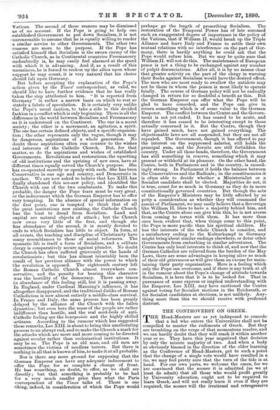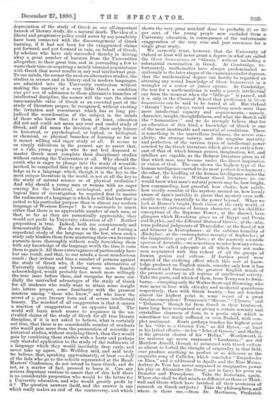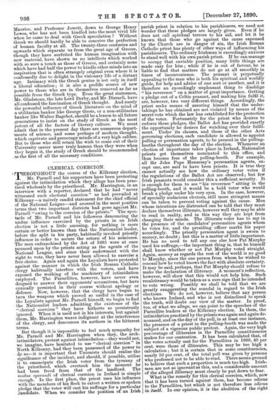THE CONTROVERSY ON GREEK. T HE Head-Masters are as yet indisposed
to concede that a lad who enters the Universities shall not be compelled to master the rudiments of Greek. But they are trembling on the verge of that momentous resolve, and we can hardly doubt that they will reach it within another year or so. They have this year negatived that decision by only the minute majority of two. And. when a body so obviously biassed in the direction of the older learning as the Conference of Head-Masters, get to such a point that the change of a single vote would have resulted in a tie, we may feel pretty sure that the turn of the tide is at hand. For our own parts, we welcome the omen, for we are convinced that the sooner it is admitted (as we at least do admit) that all those who would profit greatly by University education, ought not to be required to learn Greek, and will not really learn it even if they are required, the sooner will the irrational and retrogressive depreciation of the study of Greek as one all-important branch of literary study, die a natural death. The idea of a liberal and progressive policy could never by any possibility have been connected with the discouragement of Greek learning, if it had not been for the exaggerated claims put forward, and put forward in vain, on behalf of Greek, by scholars who have only succeeded thereby in driving away a great number of learners from the Universities altogether, to their great loss, and in persuading a few to waste their time on acquiring a merely nominal acquaintance with Greek that never results in any real intellectual gain. To our minds, the sooner the modern alternative studies, the studies in science and in history and in modern languages, are admitted into the University curriculum without making the mastery of a very little Greek a condition sine gad non of admission to those alternative branches of intellectual discipline, the sooner will the vast, the almost immeasurable value of Greek as an essential part of the study of literature proper, be recognised, without exciting the irritation and resentment which has so long pre- judiced the consideration of the subject in the minds of those who knew that, for them at least, education did not and could not mean any real and useful study of Greek, and did mean the devotion of their early leisure to historical, or psychological, or logical, or biological, or chemical, or physical branches of learning so far as it meant willing and eager study at all. It seems to us simply ridiculous in the present age to assert that, as a rule, young people who do not feel disposed to master Greek must complete their disciplinary studies without entering the Universities at all. Why should the youth who is eager to plunge into the study of scientific method, be compelled first to get up a smattering of know- ledge as to a language which, though it is the key to the most unique literature in the world, is not at all the key to the study of natural science or of physical evolution ? And why should a young man or woman with an eager craving for the historical, sociological, and palmonto- logical lines of investigation be required first to master the rudiments of a language in which he will find less that is suited to his particular purpose than in almost any modern language of Western Europe ? Is it reasonable to assert either that there is no appreciable number of such men, or that, so far as they are numerically appreciable, they would not profit by University education at all ? Neither proposition is true. Indeed, both are conspicuously and demonstrably false. Nor do we see the good of forcing a superficial study of the language on the few, when such a study only hinders them from mastering their own favourite pursuits more thoroughly without really furnishing them with any knowledge of the language worth the time it costs them to gain it. All these extravagances of partisanship have but one result, and that, to our minds, a most mischievous result ; they irritate and bias a number of persons against the study of Greek who, if the various alternatives of University teaching and learning were more frankly acknowledged, would probably face much more willingly the true issue before them, and recognise far more cor- dially the unrivalled advantages of the study of Greek for all students who really want to attain some insight into letters proper, some familiarity with the greatest masters among " those who know," and who know the secret of a pure literary form and of severe intellectual beauty. The mischief of all exaggeration is that it causes a reaction of exaggeration of an opposite kind. The world will learn much sooner to acquiesce in the un- rivalled claims of the study of Greek for all true literary discipline, if it is not asked to believe, what is certainly not true, that there is no considerable number of students who would gain more from the prosecution of scientific or historical studies, without studying Greek, than they would gain by combining these studies with a hasty and perhaps only wasteful application to the study of the rudiments of a language which they would inevitably drop early, and never take up again. Mr. Welldon said, and said truly we believe, that, speaking approximately, at least one-half of the lads who go to the schools represented at the Head- Masters' Conference, do not intend to learn Greek, and do not, as a matter of fact, proceed to learn it. Can any serious disputant venture to assert that of this half there is no considerable proportion who would be the better for a University education, and who would greatly profit by it ? The question answers itself, and the answer is one which really makes an end of the controversy, and which shows the very great mischief done to probably 25 or 30t; per cent. of the young people now excluded from a University education, in consequence of the unfortunate exaggeration of the very wise and just reverence for a single great study.
We earnestly trust, however, that the University of Oxford at least will never grant a degree in what are called the Merle humottiores, or "Greats," without including a substantial examination in Greek. At Cambridge, un- fortunately, mathematics have always predominated so uniformly in the later stages of the examinationsfor degrees, that the mathematical degree can hardly be regarded as attesting any sound knowledge of Nene humaniores in a wrangler or a senior or junior optime. At Cambridge> the test for a mathematician is really a purely intellectual one from the moment when the " little-go " is passed, and it is only in the Classical School that proficiency in literati hunzanioree can be said to be tested at all. But Oxford, " Greats" have always tested something much more than mere intellectual capacity and acquirements,—namely„ character, insight, thoughtfulness, and what the Scotch ear the " humanities ;" and we do strongly believe that for an education of this kind, a, knowledge of Greek is one of the most inestimable and essential of conditions. There is something in the marvellous freshness, the severe sim- plicity, the strange variety, and the singular maturity and perfection of the various types of intellectual power covered by the Greek literature which gives as early a fore- cast of that of which human genius, imagination, wit, and intellect are capable, as the Hebrew literature gives us of that which man may become under the direct inspiration or vision of God. The one shows the highest type of the human intelligence carried to its most perfect development ; the other, the kindling of the human intelligence under the flame of the divine. Without Greek literature no one would know what man's natural powers may be, how bright, how commanding, how graceful, how elastic, how subtle, how vividly sensible of the mystery around us, how keenly aware of man's inability to pierce that mystery even suffi- ciently to cling trustfully to the power beyond. When we look at Homer's bright, fresh vision of the early world, at his masterly cartoons of human character, at his childlike conceptions of the Supreme Power ; at the shrewd, keen glimpses which Herodotus gives us of Egypt and Persia and Scythia, and the different States of Greece ; at the calm, terse political judgments of Thucydides ; at the flood of wit and humour in Aristophanes ; at the sublime humility of Aschylus ; at the contemplative serenity of Sophocles ; at the imaginative grasp of Plato ; at the masterly scientific- apercue of Aristotle,—we sometimes wonder how any educa- tion can be called adequate at all which does not make- men acquainted with this richest of all the groups of human genius and culture. If further proof were- wanted of the vivifying effect which this sort of know- ledge produces on English minds, consider only how it has• influenced and fascinated the greatest English minds of the present century in all regions of intellectual activity. Take the poets, and which of them, from Tennyson to Swin- burne,—excepting only Sir Walter Scott and Browning, who, were more in love with chivalry and mediaeval quaintness respectively, than with Greek beauty,—has not touched almost his highest point in some recast of a great Grecian conception ? Tennyson's " (Enone," " Ulysses," and " Tithonus," though far from Greek in their treatment,. have long been recognised as giving a certain serenity and crystalline clearness of form to a poetic style which is sometimes too much suffused, or even flushed, with com- plex sentiment. Keats perhaps touches his highest point in his "Ode to a Grecian Urn," as did Byron,—at least in his lyrical efforts,—in his " Isles of Greece," and Shelley in the greatest chorus of his " Hellas." Wordsworth in his maturer age never surpassed " Laodamia ;" nor did Matthew Arnold, though so saturated with Greek culture as almost to forbid the thought of originality in that field; ever produce anything so perfect or so delicious as the- exquisite song of Callicles, which concludes " Empedecles on Etna," and is addressed to Apollo and the Nine Muses.. Aubrey de Vere has never surpassed in imaginative power his play on Alexander the Great, nor in fancy his poem on Demeter and Persephone. Take the historians, again. Where else shall we find minds so different as those of wall and Grote which have lavished all their acuteness of research on Greek subjects ? Take the philosophers, sad where is there one,—from Dr. Martineau, Frederick Maurice, and Professor Jowett, down to George Henry Lewes, who has not been kindled into the most vivid life when he came to deal with Greek speculation ? Without Greek we should hardly be able to conceive the perfection of human faculty at all. The twenty-three centuries and upwards which separate us from the great age of Greece, though they have surfeited the human imagination with new material, have shown us no intellects which worked with so sure a touch as those of Greece, and certainly none which have had half the power to kindle other minds into an inspiration that is often strangely original even where it is confessedly due to delight in the visionary life of a distant age. Intimacy with the Greek genius is not only in itself a liberal education ; it is also a prolific source of new power to those who are in themselves removed as far as possible from the Greek type. Even the great statesmen, Mr. Gladstone, the late Lord Derby, and Mr. Disraeli, have all confessed the fascination of Greek thought. And surely the powerful influence of Greek literature on the mind of a utilitarian banker like George Grote, or a non-utilitarian banker like Walter Bagehot, should be a lesson to all future generations to insist on the study of Greek as the most potent of all the factors of literary culture. We must admit that in the present day there are numerous depart- ments of science, and some perhaps of modern thought, which captivate and preoccupy minds of a very high calibre. But to those who still retain the wish to come out of their University career more truly human than they were when they began it, the study of Greek should be recommended as the first of all the necessary conditions.




































 Previous page
Previous page